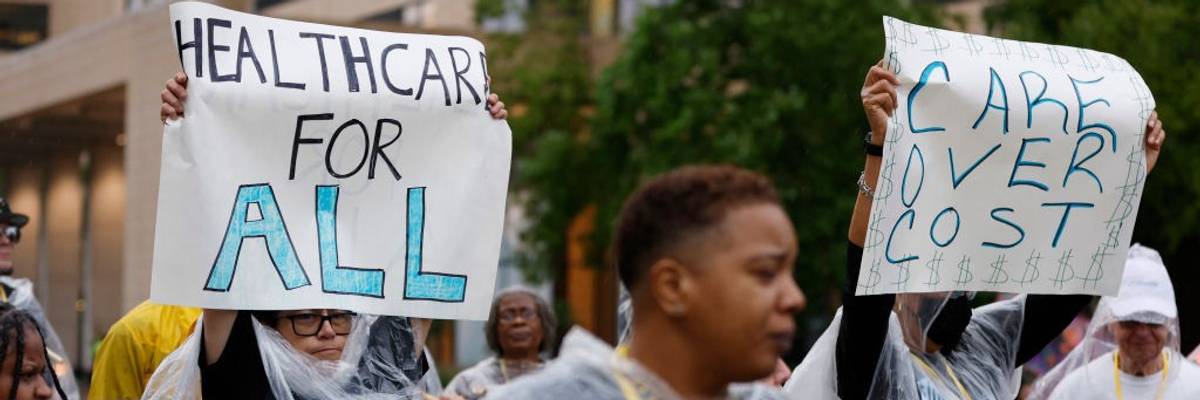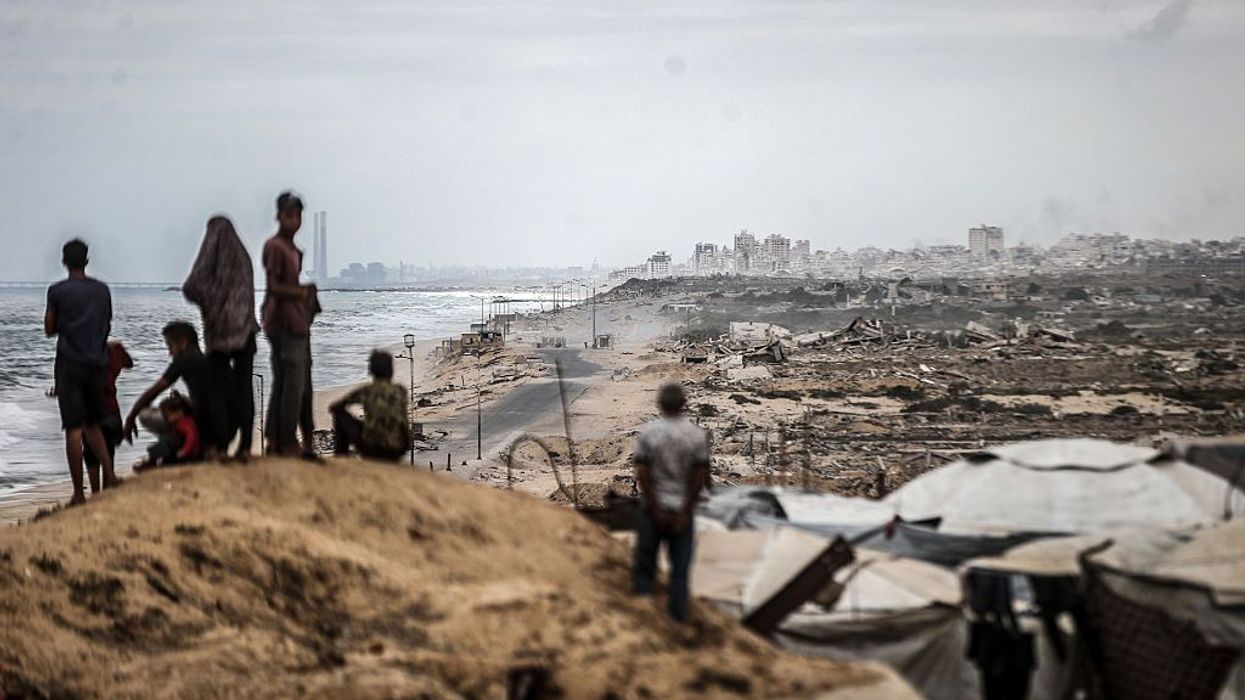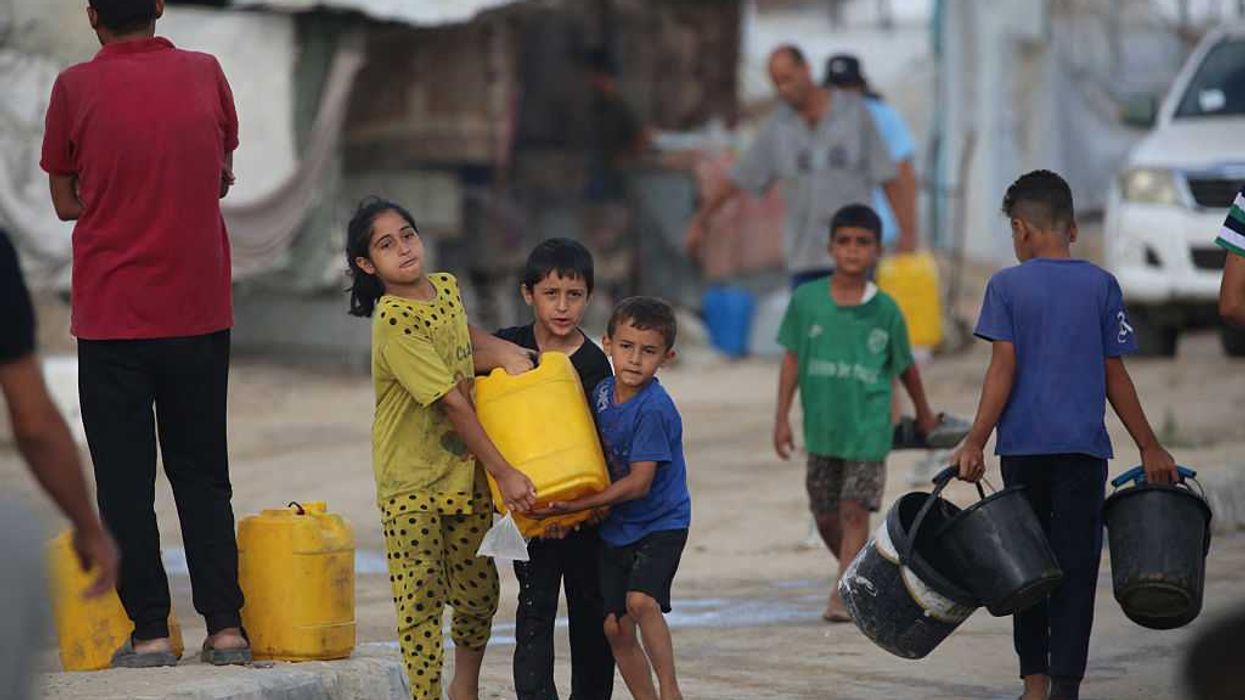Trump’s plan was based on cornering Hamas into a series of steps it hadn’t agreed to: freeing all the Israeli prisoners in Gaza without a full Israeli withdrawal; surrendering its weapons and its role in Palestinian politics; and handing Gaza over to a new phase of Israeli occupation. Gaza would be governed by a “board” headed by Trump and former UK prime minister Tony Blair, who not only invaded Iraq alongside the US in 2003, but at the same time masterminded a dirty war against Hamas that led to the isolation and blockade of Gaza, and ultimately to the current crisis.
On October 8th, after unprecedented pressure from Arab and Islamic mediators, Hamas dropped its insistence on a full Israeli withdrawal from Gaza as a precondition for the prisoner exchange. Other details remained to be worked out, but all sides seemed to believe they were close to an agreement. A source close to the negotiators told Drop Site News that Hamas was willing to gamble on Trump’s promise to prevent the Israelis from resuming the genocide once Israel had its prisoners back.
Trump’s plan is still rife with unresolved disagreements, but it may at least lead to a ceasefire and a prisoner exchange, and the ceasefire could possibly become permanent.
Under Trump’s plan, Israel would agree to end its genocidal assault on Gaza and partially withdraw its forces, but only his word would prevent it relaunching the genocide once it had the Israeli prisoners in Gaza safely back. Israel reportedly agreed to begin allowing 600 truckloads of aid to enter each day, but it would retain control of Gaza’s borders with Israel and Egypt, and could again restrict the entry of food, medicine, and rebuilding materials at any point.
Prime Minister Netanyahu has said publicly that Israel will not withdraw its forces from Gaza until Hamas and other Palestinian forces have been removed from power and disarmed, while Hamas insists it will not disarm until the occupation of Palestine ends and its fighters can hand over their weapons to the new armed forces of the sovereign nation of Palestine.
Hamas also responded to Trump that it has no authority to act as the sole negotiator in talks on the future of Palestine. It said Palestine must be governed by Palestinians, not Trump or Blair, and that its future must be negotiated between representatives of all Palestinian factions.
So Trump’s plan is still rife with unresolved disagreements, but it may at least lead to a ceasefire and a prisoner exchange, and the ceasefire could possibly become permanent. But in any case, it is clearly designed to perpetuate, not to end, Israel’s illegal occupation of Palestine. As the Progressive International said in a statement on October 7th:
“Far from paving a path to peace, it offers a blueprint for the further colonisation and subjugation of the Palestinian people — the culmination of decades of dispossession and destruction that reached its dark zenith in the ongoing genocide in Gaza.”
Whatever the result of these negotiations, the UN and the world’s governments should not sit idly by as passive observers. The UN should urgently prepare to take the concrete steps that leaders from around the world called for at the General Assembly in September, to give force to UN General Assembly resolutions calling for an immediate and permanent ceasefire in Gaza, the unrestricted restoration of life-saving humanitarian aid, and a final end to the brutal Israeli occupation of Palestine.
In July 2025, the UN General Assembly organized a “High-level International Conference for the Peaceful Settlement of the Question of Palestine and the Implementation of the Two-State Solution.” The conference was chaired by France and Saudi Arabia, and its goal was “not only to reaffirm international consensus on the peaceful settlement of the question of Palestine but to catalyze concrete, timebound and coordinated international action toward the implementation of the two-State solution.”
The conference produced a lengthy “New York Declaration,” which was endorsed by the General Assembly in a resolution on September 12th, by a vote of 142 to 10, with 12 abstentions.
But this was a plan for the “day after,” which, by itself, failed to bring that day any closer, because it deliberately avoided taking the “concrete, timebound and coordinated international action” that the conference’s mandate had explicitly called for.
The declaration was based on the deliberations of 8 working groups, co-chaired by representatives of 15 different countries, the Arab League and the European Union, which each drew up plans for the aftermath of a hypothetical permanent ceasefire in Gaza, with topics like “Humanitarian Action and Reconstruction” and “Security for Israelis and Palestinians.”
Three roundtables at the July conference, chaired by former Irish president Mary Robinson, former Colombian president Juan Manuel Santos and former UN High Commissioner for Human Rights Zeid bin Ra’ad of Jordan, agreed that the General Assembly’s first step should be the international recognition of the state of Palestine.
UN recognition requires the approval of both the General Assembly and the UN Security Council. However, with such a large majority of countries supporting recognition, and the United States abusing its veto to sideline the Security Council, the General Assembly can call an Emergency Special Session (ESS) to act alone under the “Uniting for Peace” principle, to officially recognize Palestine and welcome it as a full UN member.
Instead, while several Western countries finally recognized Palestine, bringing the total number who have recognized its independent statehood to 157, the declaration was endorsed in a regular session of the General Assembly that lacked the power to grant formal UN recognition.
But the most serious omission from the July 2025 conference and the September 12th resolution was that they failed to take concrete, coordinated UN action to impose a ceasefire in Gaza, the vital first step to get to the “day after” that the working groups at the conference were tasked with planning for. Trump took advantage of that omission to propose an end to the genocide in Gaza on terms that would perpetuate the Israeli occupation instead of ending it.
It was entirely predictable that Israel would reject and ignore the New York Declaration, and Netanyahu did just that in his General Assembly speech on September 26th. But after most of the delegates walked out and left Netanyahu ranting to a nearly empty hall, the Hague Group of countries led by Colombia and South Africa hosted a meeting with representatives of 34 countries to plan the coordinated, concrete action the UN must now take to end the genocide and the occupation.
As Cuban foreign minister Bruno Rodriguez Parilla told the General Assembly in his speech the next day, it should convene an Emergency Special Session “without further delay” to take concrete measures for Palestine, including a binding resolution on full UN membership.
If the large majority of countries that voted for the New York Declaration are ready to back their words and their votes with coordinated action, a UN-led trade boycott, divestment campaign and arms embargo can put enormous pressure on Israel to end its genocide in Gaza and its illegal occupation of Palestine.
If the General Assembly is serious about ending the genocide and the occupation, the Emergency Special Session must also debate and vote on a UN-led arms embargo, economic boycott and other concrete measures designed to force Israel to comply withinternational law, international court rulings and UN resolutions on Palestine.
The UN Human Rights Office in Geneva already has a database of 158 Israeli and multinational corporations that are complicit in Israel’s illegal occupation, so an international boycott of those companies could take effect immediately.
Israel is a small country, dependent on trade and economic relations with countries all over the world. If the large majority of countries that voted for the New York Declaration are ready to back their words and their votes with coordinated action, a UN-led trade boycott, divestment campaign and arms embargo can put enormous pressure on Israel to end its genocide in Gaza and its illegal occupation of Palestine. With full participation by enough countries, these steps could quickly make Israel’s position very difficult.
Many speakers at the 2025 General Assembly called passionately for this kind of decisive action to bring about a ceasefire in Gaza and end the occupation. King Abdullah of Jordan asked, “How long will we be satisfied with condemnation after condemnation without concrete action?”
President Lula said that Brazil already has an arms embargo against Israel and has cut off all trade with its illegal settlements; Turkiye severed all trade links with Israel in August; Dutch prime minister Dick Schoof called for an arms embargo and the suspension of the EU’s trade agreement with Israel; and Chadian prime minister Allah-Maye Halina declared, “Our duty from this moment on is to transform this strong declaration into concrete acts and make the Palestinian people’s hope a reality.”
The Hague Group of countries was formed by the Progressive International to support South Africa’s genocide case at the International Court of Justice and war crimes cases against Israeli officials at the International Criminal Court. In a meeting at Bogota in Colombia in July, twelve of those countries committed to an arms embargo and other concrete measures against the Israeli occupation. In his speech to the General Assembly on September 23rd, Colombian president Gustavo Petro called for an Emergency Special Session on Palestine and for a UN peacekeeping force to “defend Palestine.”
A previous Emergency Special Session in September 2024 demanded that Israel must end its post-1967 occupation of Palestine within a year. Israel’s refusal to even begin to do so, and its defiant escalation of its genocide in Gaza, increasing repression in the other occupied territories and attacks on other countries provide all the grounds the General Assembly should need to take the concrete, coordinated measures that many countries are calling for.
Tragically, instead of applying the diplomatic and economic pressure it will take to secure a ceasefire and end the occupation, France, Saudi Arabia and their partners instead relied on dangling carrots in front of Israel, such as regional economic integration and recognition by Arab and Muslim countries, to try to seduce or bribe Israel into complying with international law and UN resolutions.
Across the world, ordinary people are rising up to demand that their governments take action, while flotillas of activists set sail to breach the blockade of Gaza that their governments have failed to challenge.
This was never going to work. The toothless New York Declaration, and now Trump’s new occupation plan for Gaza, offer little hope for the future to the besieged, starved, bombed people of Gaza. The UN General Assembly must follow up on these flawed initiatives with decisive UN-led action to ensure a real, permanent end to the genocide and the occupation, by imposing economic sanctions, an arms embargo and other measures to diplomatically and economically isolate Israel.
There is nothing to prevent the UN General Assembly from quickly convening a new meeting of its Emergency Special Session on Palestine. The ESS can finally take the “concrete, time-bound, coordinated international action” that the French- and Saudi-led initiative promised but failed to deliver—what Malaysian foreign minister Mohamad Hasan described to the General Assembly as “concrete action against the occupying force.”
Across the world, ordinary people are rising up to demand that their governments take action, while flotillas of activists set sail to breach the blockade of Gaza that their governments have failed to challenge.
The Emergency Special Session of the UN General Assembly, meeting under the Uniting for Peace principle, can debate and pass binding resolutions on UN recognition of Palestine, a UN-led international arms embargo, economic boycott and disinvestment campaign, war crimes prosecutions, and other measures to diplomatically isolate Israel.
By responding to calls of conscience from their own people, voting for these measures at the UN and acting quickly to enforce them, the governments of the world have the collective power to end this genocide and the brutal, illegal occupation of Palestine that it is part of. Now they must use it.




